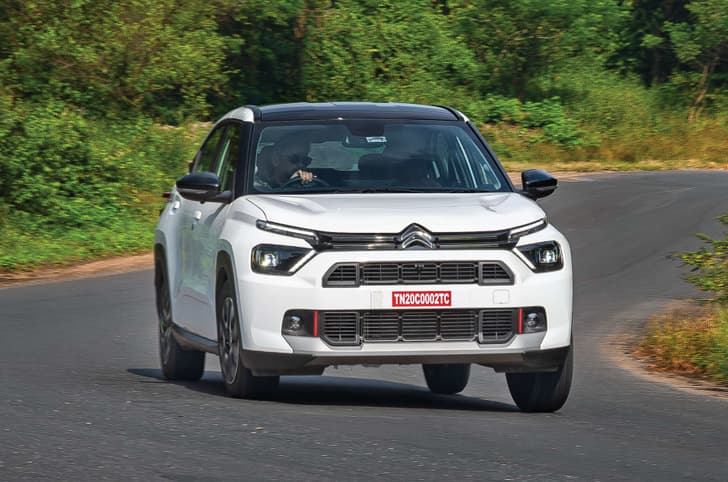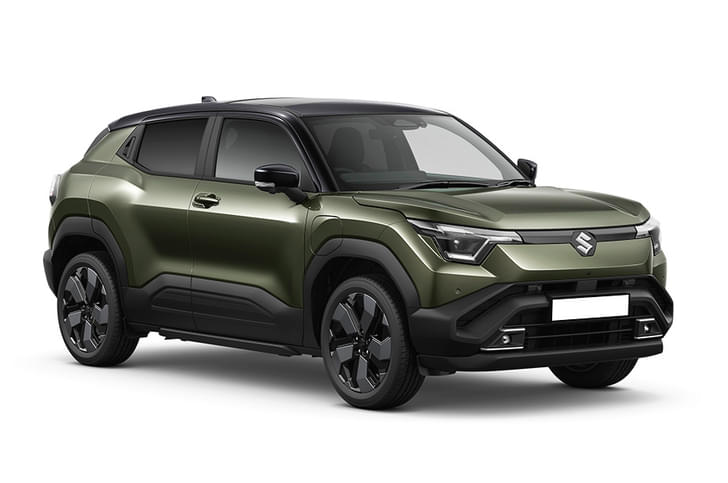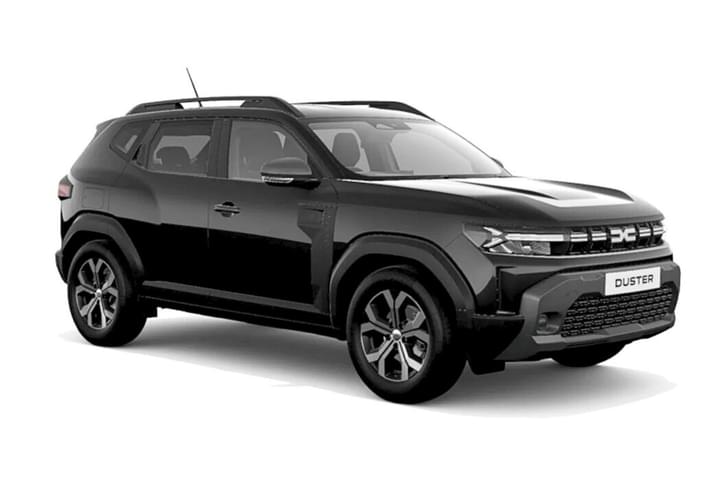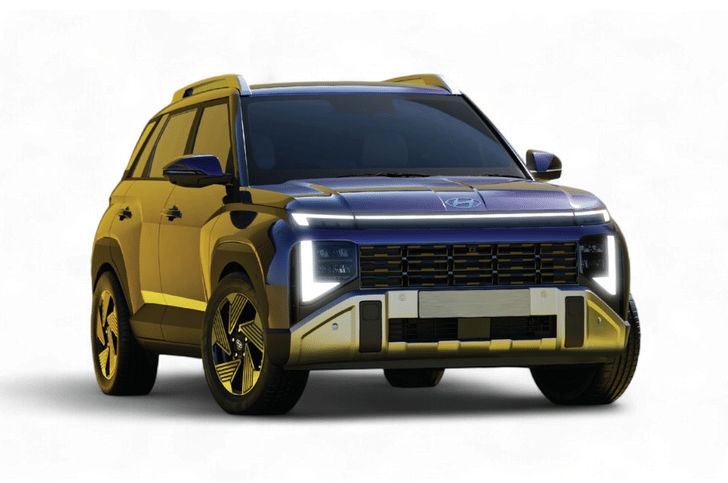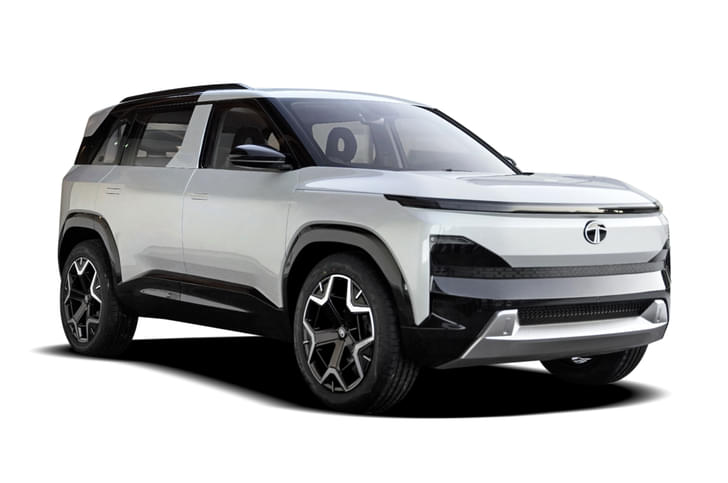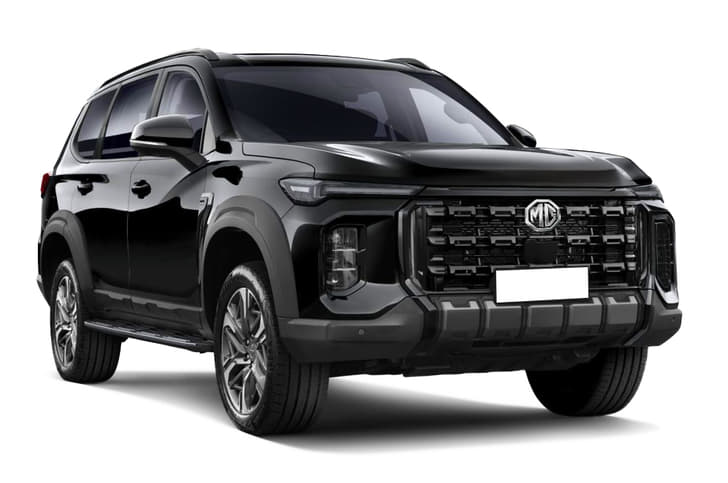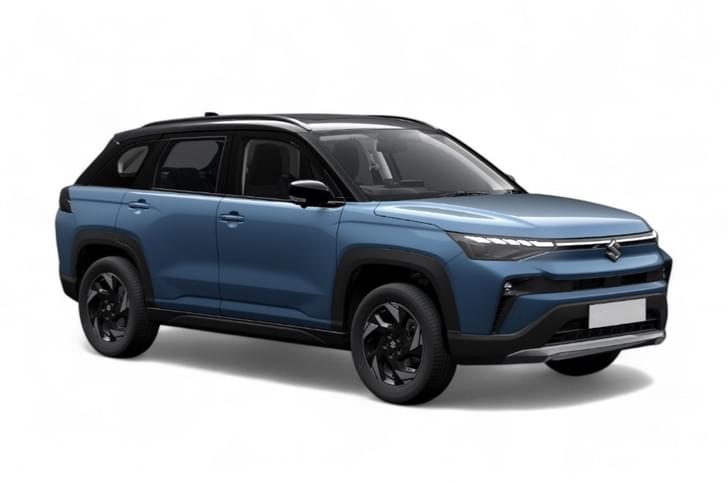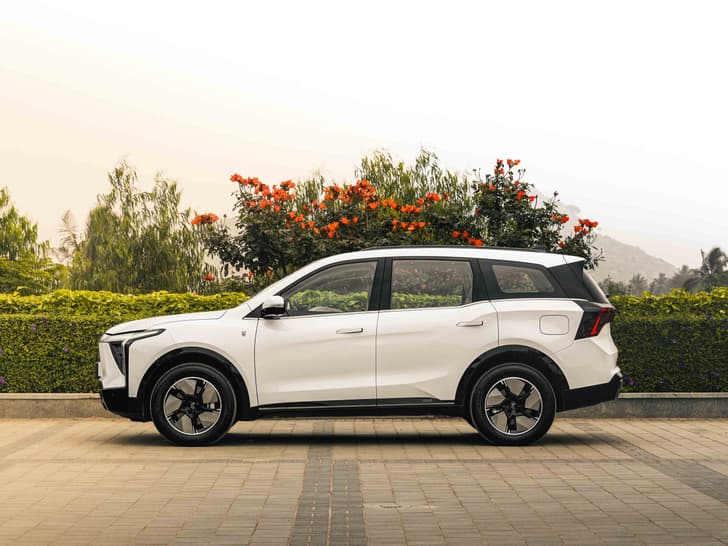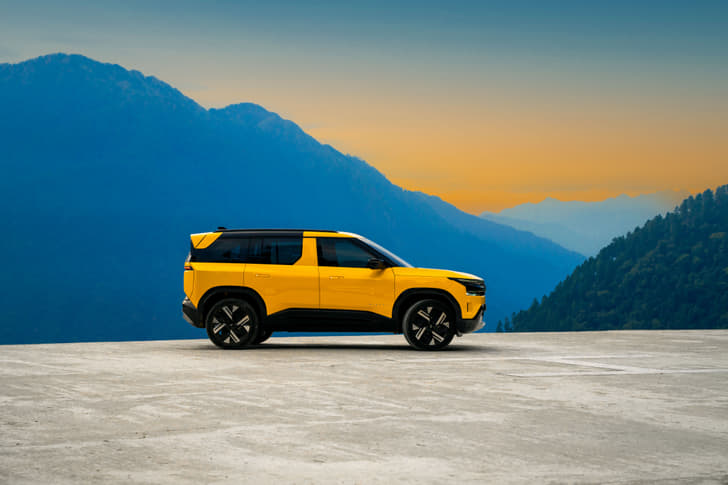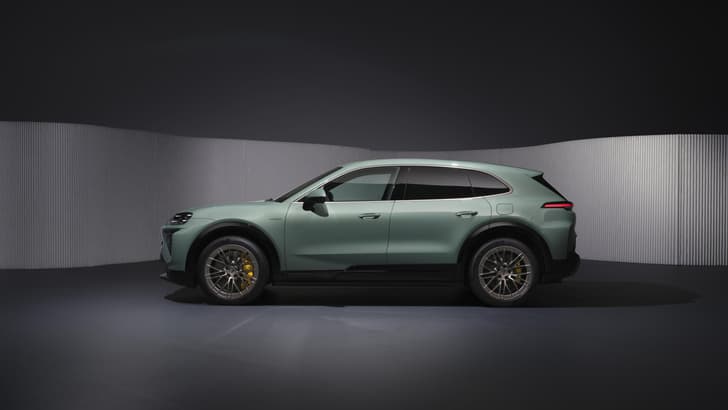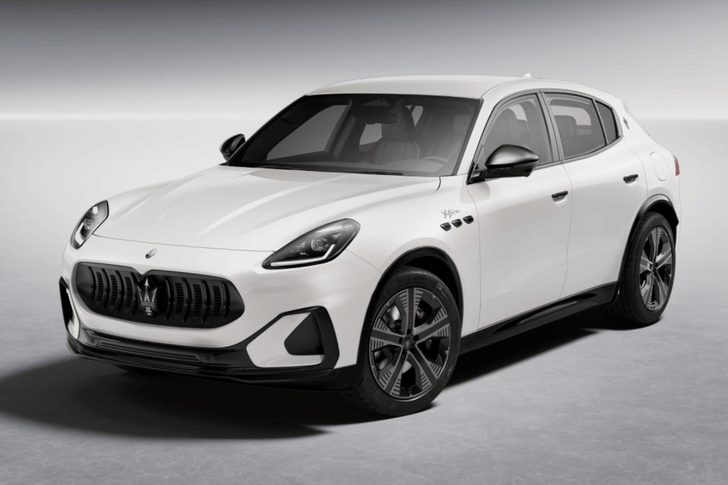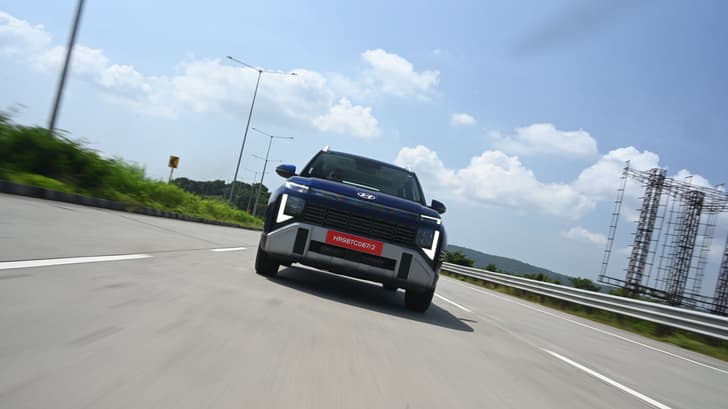The EQS is the future of Mercedes-Benz and a good hard look at what lies ahead for the world’s oldest carmaker, which has given notice to the combustion engine. The company has stated that it will make its range fully electric by 2030, well before the EU’s end date of 2035 for the internal combustion engine.
The EQS is the first Mercedes to be built on a bespoke EV architecture rather than on an IC engine platform modified for electrification. Developed from a clean sheet, the grounds-up EQS – freed from IC engine encumbrances – ditches many century-old traditions and is built in a state-of-the-art factory with the latest production processes. In short, this is the most radical, revolutionary and high-tech Merc you can buy.
 The EQS ditches the typical three-box shape of a sedan for a more mono-volume silhouette.
The EQS ditches the typical three-box shape of a sedan for a more mono-volume silhouette.
This is immediately obvious in the EQS’s shape; so far removed from the stately ‘three-box’ S-class. The cab-forward, almost ‘one-box’ or mono volume silhouette is very un-Merc and you’d never imagine this was a Mercedes if not for the big three-pointed star on the grille. Except that it’s not a grille but a blanked out, black panel with several miniature three-pointed stars etched on it and lit by tiny LED lights. A full-width LED strip that runs across the edge of the bonnet connects the headlamps, whilst at the rear, the tail lights, with their ‘helix design’, have fantastic detailing and are joined by a light band too. At night, the illuminated lights look absolutely stunning.
Mercedes EQS: exterior
The EQS is a big car measuring 5,216mm long, 1,926mm wide and 1,512mm tall. It has an incredibly long 3,210mm wheelbase similar to the S-class, but the overhangs are much shorter. The smooth and well-rounded design is dominated by the curved roof that arches from the front fender to the tailgate. And that’s another tradition the EQS breaks; you don’t get a typical trunk lid, but a fastback that pivots upwards, hatchback style, to reveal a vast 610-litre boot, which, again, is in sharp contrast to the small trunks we’ve always complained of in Merc sedans.

What the EQS misses out on is a front trunk, or ‘frunk’. In fact, you can’t open the front bonnet at all! The clamshell bonnet is sealed off from customers and can only be opened by workshop technicians. Try telling that to hotel security staff when they ask you to pop open the bonnet!
But, if you can’t open the bonnet, how do you top up the windscreen washer fluid? The filler bottle is integrated with a flap in the left-hand side fender which springs open with a gentle press to make filling easy. Very clever.
 Washer fluid filler integrated below the rear view mirror.
Washer fluid filler integrated below the rear view mirror.
Mercedes says that sealing off the bonnet makes the EQS more aerodynamically efficient, and this is entirely believable, because the EQS has an ultra-slippery coefficient of drag (Cd) of just 0.20, the lowest on any series production car. Also reducing drag are the flush door handles, which, incidentally, are the only common bits with the S-class. However, in every other way, the EQS hammers home the point that it isn’t an electrified S-class but an all-new EV, with S-class levels of luxury. The biggest differences lie where you can’t see them, and that is under the floor.
The EQS’s electric-only EVA platform comes with the option of a single motor for the rear axles or a pair of electric motors driving all four wheels. The talking point is the 107.8kWh battery pack, the largest yet in a production EV, that sits in a crash-proof compartment housed within the enormous wheelbase. Armed with the highest capacity battery ever, you can expect the EQS to have phenomenal range. According to a Mercedes-Benz India source, the official range ‘will be in excess of 750km’, which is an incredible 550-650km in real-world driving conditions, more than enough to kill range anxiety once and for all.
 You’d never imagine this was a Merc, if not for the big three-pointed star on it.
You’d never imagine this was a Merc, if not for the big three-pointed star on it.
The flip side is that a bigger battery takes longer to top up. In Europe, the ultra-fast charging network (200kW and above) will top up from 10-80 percent in around half an hour. However, in India, you would be lucky to find anything more than a 50kW DC charger, which would take around 90-95 min for the same 10-80 percent charge. Recharging at home via a 11kW wallbox fast charger will take a good 10 hours. So you need to plan your charging carefully.
Like with most EVs, the battery pack nibbles into the ground clearance, which is a precariously low 134mm on the EQS. This wasn’t a problem on Germany’s smooth roads devoid of any speed breakers and potholes, but how much of an issue this could be on Indian roads remains to be seen. Let’s not forget the EQC, Mercedes’ first EV in India, which hasn’t acquitted itself over speed breakers despite being an SUV.
 India will get 20-inchers and taller tyre sidewall.
India will get 20-inchers and taller tyre sidewall.
The EQS comes with multiple wheel size options from 19 to 21 inches. Whilst our test car in Germany came with 21 inches, the India-spec car will get 20 inchers and a taller tyre sidewall for better cushioning against our roads.
Mercedes EQS: interior
If the exterior is revolutionary, the interior is straight out of Star Trek. The EQS’s spaceship-like cabin is jam-packed with the latest tech and a digital overkill. The hero is the much vaunted 56-inch ‘Hyperscreen’ that stretches pillar-to-pillar, across the dashboard. When you get down to using it, you realise it’s actually three screens joined together under one continuous glass panel. The driver and front passenger get a 12.3-inch screen each, whilst the main infotainment system in the centre gets a rather large 17.7-inch touchscreen display. The driver’s screen is similar to the screens in other Mercs with the MBUX system, which, along with a useful and crisp heads-up display, gives you all the info you need.
.jpg?w=700&c=0) The 56-inch Hyperscreen houses three screens for the driver and front passenger.
The 56-inch Hyperscreen houses three screens for the driver and front passenger.
Mention must be made of the upgraded navigation software that combines a real time video of the road ahead with directions overlaid on the image. It works brilliantly, especially when navigating through complicated motorway interchanges. The front passenger has lots to play with on their screen other than viewing the map or choosing music. There are a bunch of games, like the very addictive Tetris, bundled into a unit to keep you engaged for hours. However, the driver won’t be able to see your scores or know what you’re up to because from the driver’s seat, the display of many functions can’t be seen to avoid distraction. That’s tech for you!
The main screen is similar in functionality to those in the new S-class and C-class and, as far as touchscreens go, is quite intuitive to use. The menus you swipe through are all logically laid out, whilst the aircon icons are permanently displayed at the bottom of the screen for easy access. There are no old-fashioned buttons and even the few ‘hard’ buttons for the drive modes, volume control and hazard lights are touch sensitive. Worse are the touch sensitive controls on the steering wheel present in every new generation Merc which you have to annoyingly frisk to get them to work. The seat control ‘pictogram’ on the door panel is also touch capacitive and the juicy tactile clicks with which these controls operated on previous generations of Mercs is now gone.
To make up, the EQS’s ‘Hey Mercedes’ voice assistant is possibly the best in any car. It’s eerie how easily it understands commands said in different ways and accents, be it from switching on the cruise control, opening the sunroof, turning on the aircon, getting a massage or plotting a new route on the nav. In fact, so good is the EQS’s voice assist that it makes quite a few touchscreen functions redundant. And, of course, you have Apple CarPlay and Android Auto, which make the most of the big screen.
 Rear-seat legroom is fantastic, but space tight for a fifth passenger.
Rear-seat legroom is fantastic, but space tight for a fifth passenger.
You have to crouch a bit to get inside the cabin, but once you’ve plonked yourself on the soft-leather seats you’ll find they are the epitome of comfort. The front seats have generous back and under thigh support with ample bolstering all round to nicely cosset you. In the Exclusive trim variant we tested, the seats can be cooled, heated and come with a myriad massage options.
In the backseat, the EQS isn’t as spacious as the long wheelbase S-class and the sloping roof does cut into headroom, but even tall passengers won’t have much reason to complain. Legroom is simply fantastic, there’s lots of underthigh support and the back rest can be electrically reclined. The middle seat is quite narrow, so a fifth passenger won’t be too comfy in here and it’s best to use this limo as a four-seater by flipping down the armrest housing a detachable tablet to control entertainment in the rear seat while you lean back into the pillow soft headrests.
Like with most born-electric platforms, storage space is in abundance, especially in the central console, which doesn’t have to cede space to a transmission. The central cubby hole is spacious and under the console too, you can store a small bag.
The rest of the cabin is exquisite too and built to S-class levels of quality too. It abounds with soft touch materials and a classy mix of wood, aluminium and piano black finishes. The Walnut brown wood centre console with pin stripes on the top-spec EQS580 and the turbine vents wouldn’t be out of place on a luxury yacht. And the high-end Burmester audio system sounds just brilliant.
The adjustable ambient lighting with 64 colours to choose from brings the interiors alive at night. The LED strips running under the dash and across the doors pulsate with different colours and even glow red when you turn up the aircon temperature or floor the accelerator pedal. It’s like having a Diwali party inside without noisy fireworks! But there are fireworks of a different kind when you press down on the right pedal.
Mercedes EQS: performance
The jolt of power you get when you floor the accelerator takes you by surprise. You just don’t expect the heavy EQS to leap off the line in a very un-measured, un-Mercedes way. This isn’t a regular Merc but typical of the EV breed, which serves up torque instantly. In the case of the top-end EQS 580 tested here, it’s 856Nm and 523hp, which propels this 2,585kg limousine to 100kph via two permanent-synchronous electric motors driving all four-wheels, in just 4.3 seconds. Acceleration peters out at higher speeds, but there’s still enough grunt for rapid overtakes and high-speed cruising. On a derestricted section of the autobahn, hitting 160kph was a breeze, after which progress was less rapid.
 The tomb-like silence inside the cabin sets a new benchmark for refinement.
The tomb-like silence inside the cabin sets a new benchmark for refinement.
The EQS isn’t meant to be a performance sedan (for that there’s the EQS AMG 53) and prioritises refinement and comfort over everything else. EVs are meant to be quiet and the EQS is shockingly so with only a small hint of wind noise above 120kph. The tomb-like silence inside the cabin sets a new benchmark for refinement and you can actually hear yourself breathe. If you want sound, you can have it artificially induced by choosing from a selection of powertrain soundtracks – a synthesised mimicry of engine notes, with corny names like “Silver Waves” and “Vivid Flux”. It sounds quite silly and is best switched off, so you can enjoy total silence, which is one reason to buy an EV. If there’s a niggle, it’s the aircon fan, which, in the solitude of the cabin, sounds too loud if the blower speed is more than two.
 Despite weighing 2,585kg, the EQS feels agile on the road.
Despite weighing 2,585kg, the EQS feels agile on the road.
Despite its weight, the EQS feels quite agile and nimble and flows quite happily down a twisty road. The steering, though lacking in feel, is quite light; it’s not a very engaging car to drive, but there’s little body roll and is quite responsive to direction changes, which eggs you on to hustle it in, again in a very un-Merc way. (How many times have we used this term by now?!) The key to EQS’s easy handling is low centre of gravity from the hefty battery and four-wheel steering – standard on the 580 variant. The rear wheels turn by as much as 4.5 degrees, which makes the EQS feel quick and shrinks the turning radius to just 11.9mm – fantastic for such a long-wheelbase car.
Ride quality is again amazing and you simply can’t feel the road under you. The adaptive air suspension can predict and remember the road in front of you, and does a great job of isolating you from bumps and bad surfaces. It’s just that it was hard to find a bad stretch of road in the countryside outside Stuttgart. The final test for all that suspension tech will be on the streets of India and it remains to be seen how well the EQS copes in hostile conditions.
 The fantastic roads in the countryside out Stuttgart gave us little idea about the EQS' ride quality.
The fantastic roads in the countryside out Stuttgart gave us little idea about the EQS' ride quality.
The brakes were a bit disappointing and lacked feel especially with the regen on zero. The middle regen setting (operated via the paddle shifters) improved braking feel, whilst the most aggressive setting was strong enough for one-pedal driving.
Mercedes EQS: expected price, verdict
Mercedes-Benz India will first launch the AMG EQS 53 on August 24, and follow it up with the EQS 580 sometime during the festive season. While the AMG EQS 53 will be brought in as a Completely Built Unit (CBU), the EQS 580 will take the Completely Knocked Down (CKD) route.
Prices are not certain, but estimate it to be anything between Rs 1.82 crore and Rs 2 crore, which is on the pricier side. But what is for certain is that the EQS will blow the luxury EV market away with its futuristic design, space-age cabin and brilliant driving experience. Despite breaking the mould and many Mercedes traditions, the EQS has not lost sight of what the brand stands for. It’s still got luxury, refinement and quality at its core, wrapped in a high-tech package. This is the best electric luxury car by far.



